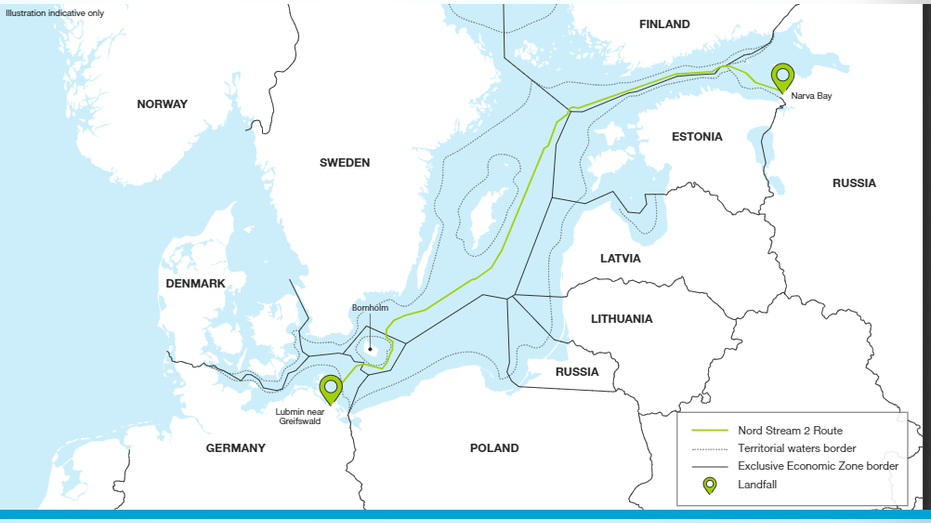A Russia-Ukraine war would mean global energy shock
Oil topped $93 per barrel in the eighth straight week of gains
Kudlow on how Biden should handle possibility of Russian invasion of Ukraine
FOX Business host gives his take on the possibility of Russia-Ukraine bloodshed on 'Kudlow.'
As a war between Russia and Ukraine seems more likely, so does a shock to global energy markets.
Oil rose for the eighth straight week, topping $93 per barrel on Friday.
| Ticker | Security | Last | Change | Change % |
|---|---|---|---|---|
| USO | UNITED STATES OIL FUND - USD ACC | 81.21 | +1.80 | +2.27% |
RED-HOT INFLATION GAVE MOST AMERICANS A PAY CUT IN JANUARY
Russian President Vladimir Putin has Europe in his back pocket. With rash decisions to reach net-zero emissions by 2050, investment in oil fields has fallen off. At the same time, Europe cut the use of nuclear power, which ironically does not emit greenhouse gases. Those decisions could have long-lasting consequences for the continent and the world as Europe has ended up sacrificing its ability to create its own energy, playing right into Russia’s hands.
Brent, the global benchmark, hit $94 per barrel.
INFLATION ACCELERATES 7.5% IN JANUARY, HITTING A FRESH 40-YEAR HIGH
| Ticker | Security | Last | Change | Change % |
|---|---|---|---|---|
| BNO | UNITED STATES BRENT OIL FUND - USD ACC | 34.03 | +0.77 | +2.32% |
Germany is one of the main examples of this craziness after it decided that nuclear power was too dangerous and vowed to replace it with renewable energy. Yet, Germany found it is not possible to replace the power from its 19 nuclear reactors with renewables, and so it had to look for alternatives. The best alternative it found was natural gas. Yet, the country could never produce the amount of natural gas it needs, so it decided to look to Russia as a supplier.
| Ticker | Security | Last | Change | Change % |
|---|---|---|---|---|
| UNG | UNITED STATES NATURAL GAS FUND - USD ACC | 11.80 | -0.07 | -0.59% |
That’s why the $11 billion Nord Stream 2 undersea pipeline between Russia and Germany is being used as a political weapon as Russia has seemingly held back supplies to Europe, not only to make more money but as a reminder of its energy dominance. It was also a warning to Europe that it had better be careful if it decides to disrupt Russia's ambitions in Ukraine.

Over in the United Kingdom, wind and solar transition failed, so now it's more reliant on energy imports. The wind was generating 25% of England's supply, but when the wind stopped blowing, it dropped to just 7%, prompting electricity prices to jump to all-time highs.
CLICK HERE TO READ MORE ON FOX BUSINESS
The impact of this alternative energy folly is evident in data from the Energy Information Administration. European Union imports jumped back to 65.5% this year, and on top of that, 38% of the natural gas used by the EU in 2020 — and over 40% in 2022 — was imported from Russia, according to Eurostat.
Germany would have to be 'at the lead' to stop Nord Stream 2 if Russia invades: Lieberman
Former U.S. Sen. Joe Lieberman, I-Conn., discusses the fate of the Nord Stream 2 pipeline if Russia were to invade Ukraine and Biden's handling of the crisis unraveling in Eastern Europe.
The Biden administration says the U.S. will prevent Nord Stream 2 from coming online if Russia invades Ukraine. Yet if Russia then cuts off natural gas and oil supply in retaliation, can it be replaced? Maybe, if foreign natural gas and oil producers heed the Biden administration’s plea for help. The U.S. could assist, but it's unclear why we are not leaning on the domestic energy industry.
Many experts know that if Russia decides to cut the supply, it would almost be impossible to replace. At the same time, a war could critically damage energy infrastructure in the region that could take years, if not decades, to fix. Not to mention the human cost of war that is devastating. In Europe, backup energy supplies are at historically low levels, and that is partly by design.
GET FOX BUSINESS ON THE GO BY CLICKING HERE
If there is indeed a war between Russia and Ukraine, the world could experience one of the worst energy price spikes we've seen since the 1970s that could drive the world into recession, and it could push Europe back into a new Dark Age where it can't keep the lights on.
Phil Flynn is senior energy analyst at The PRICE Futures Group and a Fox Business Network contributor. He is one of the world's leading market analysts, providing individual investors, professional traders and institutions with up-to-the-minute investment and risk management insight into global petroleum, gasoline and energy markets. His precise and timely forecasts have come to be in great demand by industry and media worldwide, and his impressive career goes back almost three decades, gaining attention with his market calls and energetic personality as writer of The Energy Report. You can contact Phil by phone at (888) 264-5665 or by email at pflynn@pricegroup.com.





















